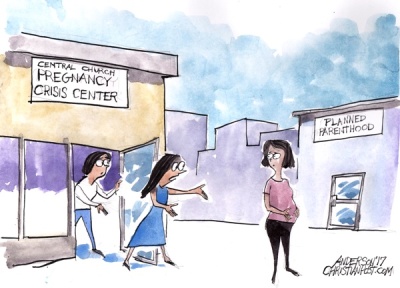The next battleground for pro-life pregnancy centers

If abortion industry activists came with a Surgeon General’s warning, it might read, “WARNING: Unconstitutional laws targeting pro-life pregnancy centers may be hazardous to state and municipal budgets.”
Why? In their zeal to implement abortion on demand until birth, the abortion industry has increasingly pressured state and local governments to discriminate against pro-life pregnancy centers. Since 2014, this has resulted in state and local governments paying more than $2.3 million in costly judgments after enacting unconstitutional regulations targeting pro-life pregnancy centers.
The state of Connecticut could be next, having passed a law earlier this year forcing pro-life pregnancy centers to comply with state-approved speech or face punishment. The law allows the Connecticut attorney general to force pro-life pregnancy centers to adopt “corrective advertising” based on whether or not he approves of their pro-life message.
The U.S. Supreme Court found a similar California law to be unconstitutional in 2018.
Why does the abortion industry try so hard to regulate pro-life pregnancy centers, even in the face of repeated legal defeats? Probably because when women who are considering an abortion receive an ultrasound from a pro-life pregnancy center, they overwhelmingly make a decision for life, according to the National Institute of Family and Life Advocates.
The abortion industry feels threatened by more than 2,700 pro-life pregnancy centers in the United States which provide millions of Americans with high-quality services, usually at no cost, totaling hundreds of millions of dollars worth of benefits to their communities each year. Clients of pro-life pregnancy centers also report very high satisfaction rates upwards of 97%.
Are these laws necessary? Having personally testified and observed testimony in numerous hearings on such legislation, I have never witnessed a single actual client of a pro-life pregnancy center testify negatively regarding the services and treatment she received.
Yet despite the positive community impact, the strategic plan to impede the work of pro-life pregnancy centers started over two decades ago. In 2000, the extreme pro-abortion group NARAL Foundation published and privately distributed its third edition of “Unmasking Fake Clinics,” a booklet providing step-by-step details designed to target and discredit pregnancy centers, including sending spies acting as clients to manipulate volunteers and providing phone scripts for abortion activists to do the same.
In the late 2000s, multiple pro-abortion groups rallied around NARAL’s tactics. From 2008 to 2010, eight states — including Maryland, Michigan, New York, Oregon, Texas, Virginia, Washington, and West Virginia — introduced unnecessary and hostile legislation to regulate pro-life pregnancy centers. All the bills failed, usually at the committee level.
After so many defeats at the state level, the abortion industry turned its efforts to bully pro-life pregnancy centers by advocating for regulations at the local level. In doing so, they failed to warn public officials that passing such patently unconstitutional bills would subject their jurisdictions to costly lawsuits. Indeed, four jurisdictions enacted regulations that discriminate against pro-life pregnancy centers and all four saw significant judgments against them.
- NIFLA v. Becerra, where California was ordered to pay $399,000 to compensate for pro-life pregnancy centers’ legal fees.
- Centro Tepeyac v. Montgomery County, where Montgomery County, Maryland paid $375,000 in attorney’s fees and nominal damages.
- Greater Baltimore Center for Pregnancy Concerns, Inc. v. Mayor and City Council of Baltimore, where Baltimore paid a pro-life pregnancy center $1.1 million to cover legal fees.
The City of Austin settled one attorney’s fee claim for an unknown amount after pro-life pregnancy center attorneys filed with the court to recover $997,144.95, with another attorney organization reporting being paid $480,000 in attorney’s fees by the city.
The latest target of these abortion industry manipulations is pro-life pregnancy centers in Connecticut, where after rejecting attempts to discriminate against pregnancy centers over the last several years, the legislature ultimately passed legislation targeting them this year.
Despite being warned in public testimony, Connecticut is now subject to a potentially costly lawsuit filed by Care Net Pregnancy Resource Center of Southeastern Connecticut, which is represented by the Alliance Defending Freedom. It is worth noting that Connecticut was encouraged to pass the 2021 bill despite the U.S. Supreme Court’s 2018 decision in NIFLA v. Becerra that found a similar California law unconstitutional.
Public testimony for the 2021 Connecticut bill included representatives of notorious pro-abortion organizations, including NARAL Pro-Choice CT, ACLU Connecticut, American Atheists, and Connecticut Women’s Education and Legal Fund. Notably, none of these pro-abortion testimonies warned Connecticut legislators of the futility of prior attempts to discriminate against pro-life pregnancy centers or of the resulting costly court judgments, though other testimonies did make this point clear.
The abortion industry’s abuse of the legislative process in this manner is flagrant malevolence. It accomplishes nothing for either the women of Connecticut or its already burdened taxpayers.
Jeanneane Maxon, J.D., is an associate scholar at Charlotte Lozier Institute. She previously served as vice president of external affairs and corporate counsel for Americans United for Life and general counsel for the Care Net pregnancy center provider network.



























